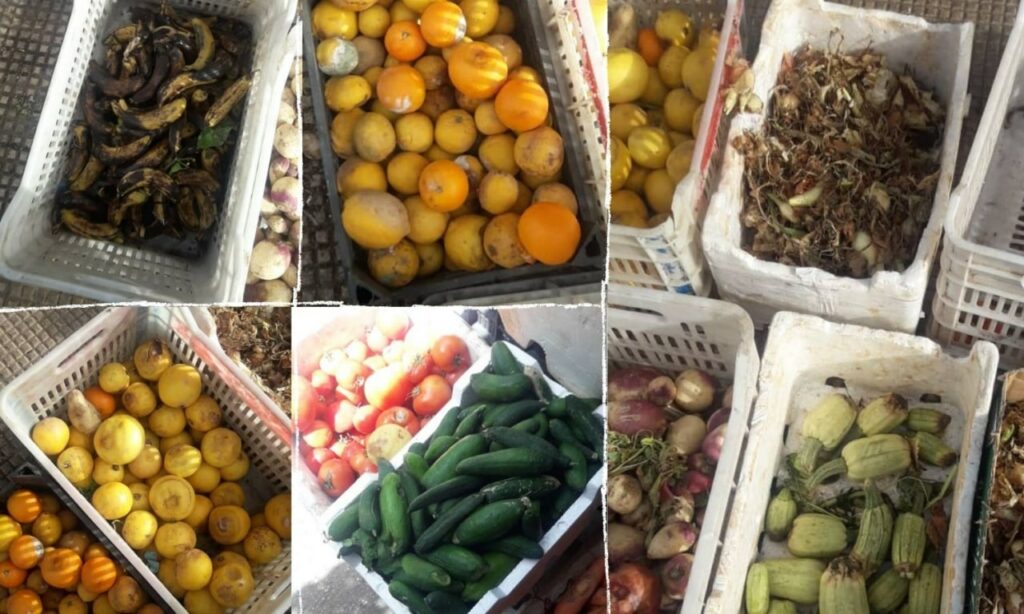The Syrian capital is witnessing a steady rise in the prices of basic materials, which prompted many people to purchase their daily needs of rotten materials offered by the Syrian Trade Establishment to consumers in its halls at “discounted prices.”
Enab Baladi has observed an increasing demand for materials offered by the state-run company at a reduced price, despite the poor quality, due to the month of Ramadan, in light of the residents’ inability to purchase foodstuffs at prices that require multiples of their monthly income.
Boxes of rotten vegetables and fruits, which often smell foul, line the doors of the Syrian Trade halls in Damascus, and although it is not a new situation, it was not that bad before, and the demand for it was not to the extent that we see now,” Raghad, 40, told Enab Baladi via a phone call.
“While I was buying my needs from one of the commercial halls, I saw an old woman packing rotten eggplants and tomatoes in a bag, and she was not the only one who came to buy from those boxes, but the two types she chose were the worst,” added Raghad who chose a pseudonym for security reasons.
The Damascene woman did not believe that someone would pay the price of a kilo of eggplant “unsuitable for human consumption” about 1,000 Syrian pounds, but that woman did, considering this price represented a quarter of the price of a kilo of eggplant, whose price amounted to 4000 Syrian pounds (1 US dollar).
The increasing demand for purchase from these boxes has turned the spoiled goods into a gateway to further exploitation by the institution, as the people are now no longer given a choice but rather are forced to buy vegetables and fruits to feed their families, according to Raghad.
Asmaa, 47, (pseudonym for security reasons) considered putting up these materials as exploitation of people’s needs, as most people are “forced and not given a choice.”
Asmaa told Enab Baladi that the current economic conditions force the people to buy the materials offered by this government institution despite their damage, noting that the Syrian Trade Establishment shows indifference to health consequences and risks of eating rotten vegetables and fruits, and keeps them exposed to the sun, which makes them more vulnerable to spoilage and rotting.
No healthy food on Ramadan tables
Despite the Syrian Cabinet’s pledge on 22 March to increase the quantities of food offered in the local markets during the month of Ramadan, the Ramadan tables are still “poor” in light of the people’s inability to purchase most of the items, even the most basic ones.
“Many of the dishes that were essential on the Ramadan table have now become a luxury that our children desire,” Raghad said, complaining about the severe shortage of the usual Ramadan dishes that families need, especially children, in order to obtain good nutrition during this month.
Preparing a salad dish in Damascus has become a luxury, says Raghad, who gives an example of her friend’s seven-year-old son, who was asked by his mother to choose between cucumbers or tomatoes to be next to lettuce, and that she was not able to prepare a salad dish with all the ingredients as before.
According to Asmaa, the Ramadan breakfast table has become limited to one dish, which the mothers prepare at the lowest possible costs by making modifications to the recipe, and excluding many ingredients such as meat.
Abdulrazzaq Habza, Secretary of the Consumer Protection Association, said on 26 March that there is a great demand for watching the foodstuffs offered in local markets rather than buying them.
“The desire to purchase and the pleasure of shopping no longer exists due to the high prices, as the citizen has become austere in his consumption by spending his money on priorities, and shortening half of the foodstuffs due to the high prices,” Habza adds.
He also pointed out that more than half of the residents do not have people outside the country to send remittances to, or they do not have a second source of income, which worsens the situation.
The deteriorating living conditions in regime-controlled areas, especially during Ramadan, are in line with the warnings of the UN World Food Program (WFP), in November 2021, of the harsh measures that the people of Syria are forced to take due to hunger and poverty.
In the meantime, justifications for raising prices continue in the regime-controlled areas as some attribute it to the advent of Ramadan month, increasing demand for food purchases, lifting government subsidies, and the Covid-19 pandemic, in addition to the Russian invasion of Ukraine, which caused a state of panic from famine in Syria.
The price of the food basket that the family needs in Syria increased by 97 percent from December 2020 to December 2021, which means, according to a report by the Save the Children organization, issued on 15 March, on the 11th anniversary of the Syrian revolution, that by the end of this year, the family will spend 41 percent of its income on food to ensure survival where about 12 million people are food insecure, about 55 percent of the Syrian population.

